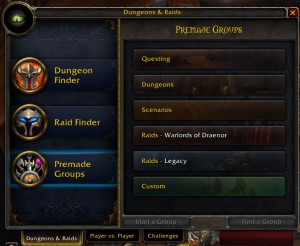Premade groups
During my ongoing literature review I often discover interesting facts about things I’ve never thought about. Sometimes I can connect these facts with my own observations: The result is mostly a completely new idea why things are as they are. Maybe these ideas are new to you, too. Therefore I’ll share my new science based knowledge with you!
This week: This time, I think about the way how the developers of World of Warcraft are trying to increase the social factor of the game.
World of Warcraft (WoW) offers a lot of content which can be only completed by grouping up with other players. In order to do so, players can form a group with friends or take advantage of the so-called „Group Finder“. The Group Finder is a tool which automatically assembles groups out of all the players who have signed up for it. Recently, the functionality of the Group Finder was extended by a new function: it received the „Premade groups“ section. This new function helps the players for find or form a group for almost anything.
The Premade Group function is especially helpful for some of the quests which can be repeated on a daily basis. Completing such a quest without the help of other players can be a time consuming task. However, grouping up for such a quest reduces the time needed by a significant degree. Moreover, the whole game world seems to become more vivid, if the player is surrounded by other players, who all are working towards the same goal.
On the other hand, being in such a group does not really change the gameplay itself and the only benefit is the reduction in time due to the contribution of all the other players being part that group. Most of the time, players are joining the group via the Group Finder and stay only as long as they are not finished with their quest. As soon as they have completed their task, the players are immediately leaving the group.
The whole concept can be summarized as a very casual form of a social interaction. It even can be seen as great example for ambient sociability[1]: the players do have the opportunity to talk to different players if they want to. Moreover, all the players are belonging to the same social scene and are included into one collaborative group.
In the end, the combination of a slow quest progression and the possibility to decrease the time needed for it by joining a group has really helped to unite the players and to create a more lively virtual world. Unfortunately, most of the players only care about the quest reward and are just trying to finish the task as fast as possible.
